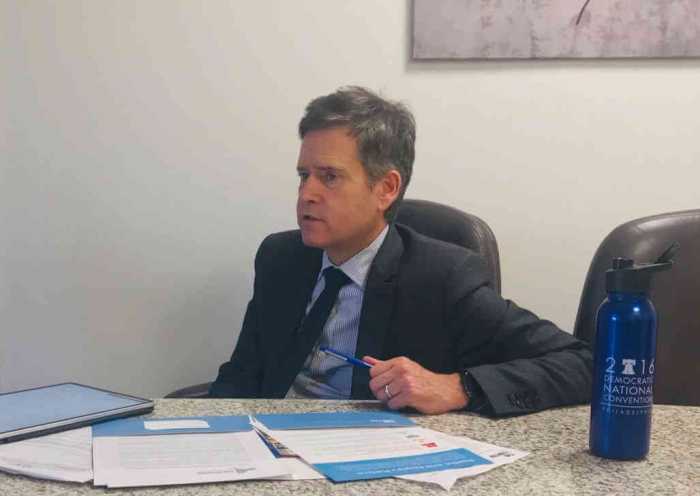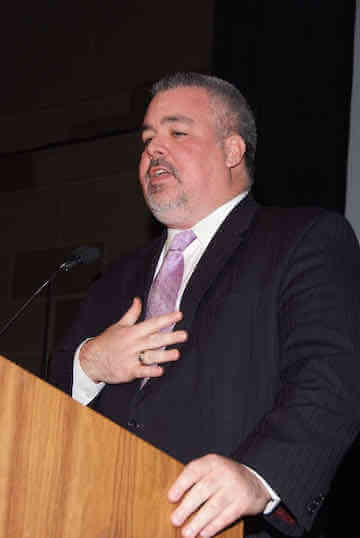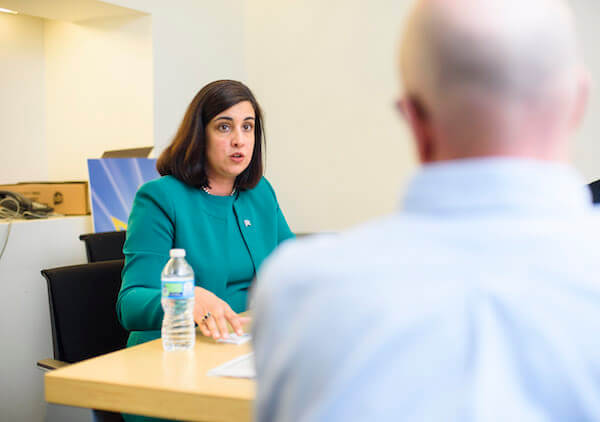COVER DESIGN BY MICHAEL SHIREY
Ten months after the Empire State Pride Agenda abruptly announced it was folding up its tent and with a presidential election looming that will also determine control of the State Assembly and Senate in Albany, two new political action committees have stepped into what would otherwise have been a political void for New York’s LGBT community.
TransPAC, a group dedicated to achieving “full and equal rights” for the transgender community founded by activists who several years earlier created the Long Island Transgender Advocacy Coalition, began to take shape in the immediate aftermath of ESPA’s announcement and has already raised close to $100,000, allowing it to be a donor in at least eight legislative contests.
A newer group, Equality NY PAC, aims to represents the broader LGBT community on a host of issues, transgender civil rights currently at the top of the list, and like TransPAC is an all-volunteer effort focused on raising funds to contribute to legislative races. To date, Equality NY has brought in about $15,000 and has made donations in two races, with at least three others under consideration. This week, the group is distributing a comprehensive voter guide, at equalityny.org/endorsements, identifying its picks for November 8.
For both groups, the current focus is on the State Senate, which in the five years since marriage equality became law in New York has been a bulwark of resistance to further LGBT advances. The Senate is in Republican hands, despite the fact that it has 32 elected Democrats and only 31 GOP members. Brooklyn’s Simcha Felder, who represents portions of that borough’s socially conservative Orthodox Jewish community, has caucused with the Republicans, and five other Democrats, under the leadership of Jeff Klein from the Bronx, caucus as the Independent Democratic Conference, and also give their votes to Long Island GOP Senator John Flanagan as majority leader.
The IDC’s members have long been strong supporters of LGBT rights and argued that their alliance with the GOP leadership offered an opportunity to bring a progressive voice to the discussion of Senate priorities. On LGBT issues – and many others – that pledge has come to naught. LGBT activists are hoping that enough seats currently in Republican hands can be flipped in November so that the IDC members return to the Democratic fold – or even that non-IDC Democrats can hold an outright majority on their own.
That latter outcome would require a big shift, with few historical precedents, but it’s not a bad bet that Democrats will run the Senate come January. In the view of Senator Brad Hoylman, a West Side Democrat who is his chamber’s only out LGBT member, at least 10 seats are in play, with nine of them currently held by Republicans. And with Donald Trump poisoning the Republican brand, even if Democrats only pick up a few of those nine seats, the IDC will find it difficult to pledge its fealty to the Republican Party in 2017, in Hoylman’s view.
TransPAC executive director Mel Wymore. | COURTESY: MEL WYMORE
For TransPAC, in 2016, control of the Senate is the whole ball game. The group has already distributed more than $75,000 in eight Senate races and expects to play in several more in the final two weeks of the campaign. Earlier this year, the group contributed to Democrat Todd Kaminsky’s successful special election run to fill the vacancy created when former Republican Majority Leader Dean Skelos was convicted on corruption charges. TransPAC is working for a Kaminsky victory for a full term next month, and is supporting Amber Small, a Democrat who is angling for an open seat in Buffalo due to rookie Democrat Marc Panepinto’s decision not to seek reelection. On Long Island, the group has donated to Democrat Adam Haber’s bid to replace Republican Jack Martins, who is running for an open congressional seat there.
The group is also backing five Democrats challenging incumbent Republicans: Ryan Cronin, who is taking on Kemp Hannon on Long Island, Jim Gaughran who is contesting Carl Marcellino’s seat, also on Long Island, Orange County Legislator Chris Eachus who is making his second run against William Larkin, Terry Gipson who is looking to recapture the seat he lost to Sue Serino in the Hudson Valley, and Sara Niccoli, a Palatine town supervisor hoping to unseat George Amedore near Albany.
Kaminsky is the one State Senate candidate that Equality NY has already donated to, and Hoylman, in his handicapping of Senate races, said the new Long Island Democrat is in a strong position for November. Hoylman also pointed to other TransPAC endorsees – Haber, Cronin, and Gaughran – as among strong contenders for flipping seats. The Small race in Buffalo is a top priority this year of the Stonewall Democrats of Western New York, according to its president, Bryan Ball.
TransPAC’s financial strength coming into this year’s general elections reflects, in good measure, the determination of transgender activists, in the wake of ESPA’s demise, not to cede initiative on their prime issues to the LGBT community’s traditional leadership. ESPA left the field with the key goal of the trans community, the Gender Expression Non-Discrimination Act, unfinished business, after the persistent refusal of the Senate Republicans to take up a measure first proposed in early 2003, when the state’s gay rights law was adopted without transgender protections.
Few activists were mollified by ESPA’s statement that a new directive from Governor Andrew Cuomo – interpreting existing state human rights law’s sex discrimination and disability discrimination protections to cover transgender New Yorkers – amounted to “securing the Pride Agenda’s top remaining policy priority, protecting transgender New Yorkers from discrimination in housing, employment, credit, education, and public accommodations.”
A stinging January letter to ESPA from Juli Grey-Owens, a former Pride Agenda board member who is executive director of the Long Island Transgender Advocacy Coalition (LITAC) – signed onto by 30 activists and organizations – “criticized Pride Agenda’s failure to fulfill their announced commitment to passage of legislation (known as GENDA) that would have added protections based on transgender status and gender identity to New York Human Rights Law. Specifically, advocates criticize the Pride Agenda for their statement of ‘mission accomplished’ in their press release because of its harmful message that transgender Human and Civil Rights are covered under New York Law.”
Grey-Owens told Gay City News at that time that transgender advocates were already in discussions about forming a trans-focused advocacy group – with the ability to make political donations – to ensure that GENDA and other issues of specific concern to their community would be prioritized by Democratic legislators in Albany. With Barbara Salva, Jeffrey Friedman, and Betsy Malcolm, colleagues of hers at LITAC, Grey-Owens soon brought TransPAC into being. Others who had signed onto the January letter, including Kiara St. James, executive director of the New York Transgender Advocacy Group, and Mel Wymore, an Upper West Side community board member who ran for the City Council in 2013, were also early players in TransPAC. In June, Wymore became executive director of the PAC.
TransPAC’s mission statement makes clear that it hopes one day to be a player on the national stage but also emphasizes that its “immediate objective” is to elect a pro-GENDA State Senate.
Noting that “it makes a difference when you write a check,” Wymore said TransPAC’s giving has opened up direct dialogue with the candidates.” And he pointed with pride to an early October fundraiser attended by State Attorney General Eric Schneiderman, Manhattan Borough President Gale Brewer, and City Council Speaker Melissa Mark-Viverito, among a host of elected officials.
“We have solidified support for our issues within the Democratic establishment,” Wymore said. “This is the cornerstone human rights issue today. We have to win this to have New York be the model for other states.”
Matthew McMorrow, who has shepherded the launch of Equality NY PAC. | DONNA ACETO
Though TransPAC is staking out an independent voice for transgender New Yorkers, the group welcomes additional efforts from the broader LGBT community. Wymore noted that Matthew McMorrow, the former director of government affairs at ESPA who is leading the charge at Equality NY, is on his 15-member advisory board at TransPAC.
“We are absolutely supportive of all LGBT issues,” Wymore said. “But we are trans-led and trans-focused.”
TransPAC’s impressive start is winning praise from longtime gay leaders. Alan Van Capelle, who led the Pride Agenda from 2003 until 2010 and was sharply critical of that group’s decision to close shop last year, said, “TransPAC is brilliant. Absolutely brilliant. This is absolutely the right environment for this to happen. And I think the world of Mel.”
Van Capelle, who helped advise McMorrow and others on the launch of Equality NY, was also upbeat about that group’s impact.
“I think there is an enormous amount of influence and power and responsibility that the community has that didn't go away when we lost our statewide organization,” Van Capelle said. “And there is a value in us organizing politically to have a voice.”
Not only is it “important for the elected officials to see us,” he added, “It’s important that the donor base not have muscle atrophy in giving. If too long a time passes without them giving to LGBT issues, it’s a hard muscle to rebuild.”
Hoylman stressed the impact that LGBT visibility in Albany can have on his fellow legislators.
“I often get asked by my colleagues, ‘What does your community want?,’” he said. “And I’d like some help on that. There is a void in the electoral process for a comprehensive voice for the LGBT community. Legislators are looking for the good housekeeping seal of approval.”
Citing the key issues of concern to him, Hoylman added, “My colleagues need to know about transgender rights, HIV/ AIDS, conversion therapy, the data disparity in state government, issues involving LGBT youth and seniors.”
Hoylman said campaign donations are important, but he hopes that TransPAC and Equality NY will also create a visible presence in Albany during the legislative session.
According to McMorrow, the genesis of Equality NY was in conversations going on statewide in the immediate aftermath of ESPA’s demise “with lots of people expressing concern about not having a statewide organization.” The consensus, he said, was that New York was not without many strong organizations doing services and advocacy. What was missing, he said, was a group that could play an explicitly political role.
Those discussions, he said, involved hundreds in the Greater New York area and upstate and aimed at inclusiveness and diversity.
Frank Selvaggi, a former Pride Agenda board chair who hosted several gatherings of activists in his home, said early discussions went round and round on a wide variety of strategic questions, but “it was hard to get the ball moving.” McMorrow, he said, “really stepped up. What initially came of it, we felt like on the lobbying side, the LGBT community needed a presence.”
McMorrow, in turn, worked closely in recent months with Gabriel Blau, the former executive director of the Family Equality Council. Crediting McMorrow with being “really motivated” to move the mission forward, Blau explained, “He was well respected and he’s a political guy. I’m an organizational structure and management guy.”
Western New York Stonewall’s Ball and Eunic Ortiz, president of the Stonewall Democratic Club of New York City, both welcomed Equality NY’s emergence, with both Ortiz and Selvaggi saying that despite the modest amount of money raised so far, the key was to telegraph to Albany that LGBT New Yorkers will remain players on the political scene.
For the time being, the community will be clearly allied with the Democratic side of the aisle, judging by Equality NY’s endorsements. In well over 100 choices at the state legislative and congressional level, every candidate is a Democrat.
State Senator Brad Hoylman. | DONNA ACETO
McMorrow explained that among legislative Republicans, only Assemblymember Janet Duprey from the Lake Champlain, has been consistent on “GENDA, the conversion therapy bill, and reproductive rights, among other important issues,” and she is retiring. Fourteen GOP members of the Assembly support a ban on conversion therapy for minors as does Long Island Senator Phil Boyle, but the group’s “primary goal” in the 2016 election “is to build a pro-GENDA majority in the State Senate.” Equality NY is making no endorsement in Boyle’s reelection bid.
The other striking aspect of the group’s voter guide is the non-endorsement of any IDC senator. Explaining that decision, McMorrow, in an email message, wrote, “All of the members of the IDC are individually supportive of GENDA and many of our other priority issues, and they should be commended for that support. Indeed, Jeff Klein recently secured a significant amount of funding for LGBTQI senior housing, and both Diane Savino and Tony Avella have gone to bat for us on a number of occasions. At the same time, however, many in the community feel that the IDC's arrangement with the Republican majority in recent years has impeded progress on GENDA and other LGBTQI legislation.”
Or, as Ortiz put it, “Are you walking the walk or just talking the talk?” While acknowledging, as McMorrow did, that IDC Democrats have endorsed LGBT goals, she argued that as a result of their alliance with the GOP leadership, “We have seen policy and budget lines stalled.”
In recognition of the need to build as diverse a political vehicle as possible, both McMorrow and the group’s voter guide also mentioned the importance of intersectional issues including immigrant rights, women’s rights, and “sensible gun control.” Going forward, McMorrow and Ortiz said Equality NY was also likely to engage on issues including criminal justice reform and living wage demands.
To date, the group has donated $1,000 to Kaminsky’s Senate reelection on Long Island, $1,000 to Assemblymember Harry Bronson, an out gay Rochester Democrat that McMorrow said “faces a tough reelection race,” and $500 to TransPAC “as a show of solidarity.”
The other top races the group is considering playing in are Amber Small’s contest in Buffalo, Ryan Cronin’s battle against Kemp Hannon on Long Island, and Terry Gipson’s bid to recapture the seat he lost two years ago in the Hudson Valley.
In addition to the Kaminsky, Cronin, Adam Haber, and Jim Gaughran races on Long Island, Hoylman also pointed to John Brooks’ challenge to Republican Michael Venditto as a race to watch.
Given the LGBT community’s commitment to winning a Democratic State Senate this November, Governor Andrew Cuomo’s headlining of a fundraising event this week for the party’s candidates –– his first such appearance –– was a welcome sign. The governor is reported to have told the crowd that if the party makes gains, the IDC will have to reconcile with the regular Democrats.
For Hoylman, the question is what follows.
“If the Democrats control the Senate, there are so many issues that are going to be on the table in the first 100 days,” he said. “How are LGBT issues going to break through?”
That, he added, is why LGBT efforts underway to stay alive on the Albany scene are so critical.






































